 WHY PEOPLE DIE BY SUICIDE WHY PEOPLE DIE BY SUICIDE Thomas Joiner Harvard University Press Cambridge, Massachusetts, and London, England This book is dedicated to those whohave lost someone to suicide, andespecially to those who have beensupportive of survivors like me,including, for example, my friendsfrom high school, who did all theright things. Copyright 2005 by the President and Fellows of Harvard College All rights reserved Printed in the United States of America First Harvard University Press paperback edition, 2007 Library of Congress Cataloging-in-Publication Data Joiner, Thomas E. Why people die by suicide / Thomas Joiner. p. cm. Includes bibliographical references and index. paper) ISBN-10 0-674-01901-6 (cloth: alk. paper) ISBN-13 978-0-674-02549-3 (pbk.) ISBN-10 0-674-02549-0 (pbk.) 1. Suicide. 2. 2.
WHY PEOPLE DIE BY SUICIDE WHY PEOPLE DIE BY SUICIDE Thomas Joiner Harvard University Press Cambridge, Massachusetts, and London, England This book is dedicated to those whohave lost someone to suicide, andespecially to those who have beensupportive of survivors like me,including, for example, my friendsfrom high school, who did all theright things. Copyright 2005 by the President and Fellows of Harvard College All rights reserved Printed in the United States of America First Harvard University Press paperback edition, 2007 Library of Congress Cataloging-in-Publication Data Joiner, Thomas E. Why people die by suicide / Thomas Joiner. p. cm. Includes bibliographical references and index. paper) ISBN-10 0-674-01901-6 (cloth: alk. paper) ISBN-13 978-0-674-02549-3 (pbk.) ISBN-10 0-674-02549-0 (pbk.) 1. Suicide. 2. 2.
Suicide victimsPsychology. 3. Suicide victimsFamily relationships. 4. Children of suicide victims. Title. Title.
HV6545.J65 2005 616.858445dc22 2005051347 CONTENTS Prologue: Losing My Dad What We Know and Dont Know about Suicide The Capability to Enact Lethal Self-Injury Is Acquired The Desire for Death What Do We Mean by Suicide? How Is It Distributed in People? What Roles Do Genetics, Neurobiology, and Mental Disorders Play in Suicidal Behavior? Risk Assessment, Crisis Intervention, Treatment, and Prevention The Future of Suicide Prevention and Research Epilogue Notes Works Cited Acknowledgments Index WHY PEOPLE DIE BY SUICIDE LOSING MY DAD PROLOGUE In 1990, close to a million people died by suicide worldwide. My dad was one of them. Of course my dads death has deeply affected both my feelings about suicide and my understanding of it. My feelings about suicide stem partly from peoples reactions to my dads death. Some friends and family reacted in ways that I still treasurethe sorts of things that make you proud to be human. Others reactions were not quite up to this very high standard.
My intellectual understanding of suicide evolved along a different track than my feelings. Informed by science and clinical work, I came to know more than most about suicideon levels ranging from the molecular to the cultural. But here too, my dads death never left me, for the simple fact that I could evaluate theories and studies on sui cide not only by formal professional and scientific criteria, but also by whether they fit with what I know about my dads suicide. As I will point out, a nagging fact about my dad left me unsatisfied with existing theories of suicide and pushed me to think in new ways about his death and about suicide in general. All of this will become 2 WHY PEOPLE DIE BY SUICIDE clear throughout the book, but first, let me turn to the details of my dads suicide. In Atlanta in the early morning hours of August 1, 1990, my dad was sleeping, or trying to, in the bed that was mine as a teenager.
He wasnt sleeping with my mom; I think his snoring had become too much of a problem. I was a graduate student in Austin, Texas at the time. It was summer, so my dad must have been alternately cold and hot in that bedcold when the air conditioning kicked in (because the vent was right next to the bed), hot when it turned off (because that room was not well insulated). My dad rose from the bed. I wonder if he made some silent gesture, like putting his hand against the wall that separated my old bedroom from his old bedroom, where my mother lay asleep. He walked past the room he had shared with my mom, and then past my younger sisters rooms, where they lay asleep.
Here again, did he hesitate as he passed their rooms, I wonder? Was he prepared with a cover story in case my mother or sisters woke up and asked him where he was going? He went downstairs. Before going out the door, he must have pulled open a drawer or two in the kitchen, looking for a large knife. Or maybe he got the knife from his fishing tackle in the garage. It surprises and distresses me even now when I cant remember or never knew a key detail like this about my dads death. He walked outside, got into his van, and drove a half-mile or so to the lot of an industrial park. He prepared no note.
At some point be fore dawn, he got into the back of the van and cut his wrists. His self injury escalated from therethe cause of death from his autopsy re port is puncture wound to the heart. These details remain very painful for me, but they are importantas will become clear, people appear to work up to the act of lethal self-injury. They do so over a Prologue: Losing My Dad 3 long period of time, by gradually accumulating experiences that re duce their fear of self-harm; and they do so in the moment, by first engaging in mild self-injury as a prelude to lethal self-injury. My dads body was not discovered until about 60 hours after his death, which necessitated a closed casket funeral. So the last time I saw my dad was in June of 1990 when I joined the family on a beach trip.
We fished and talked about the NBA finals and a large stock deal my dad was proud to have recently pulled off. We played board games in the van on the way homethe same van in which my dad died. I am still stunned to think that six weeks later he would leave the house and walk away from us forever. He never said goodbye to my mother, my sisters, or me. In the months before his death, my dad had parted ways with the company in which he had formed his professional identity and, in deed, much of his identity as an adult. The position with this com pany was one of influence, and after leaving, he struggled to regain his former feeling of effectiveness.
I think this struggle was exacer bated by some callous and self-serving behaviors by those remaining at the company, who my dad believed were friends. The first family member I saw after my dad was found was my Uncle Jim, my dads older brother. He met me at the gate at the At lanta airport. He must have been heartbroken and incredibly con fused about how his very successful little brother could have sud denly died by suicide. He shouldered this shocking burden and put it aside, at least for a while, to pay attention to how I was feeling and, in the days following, to how my mom and sisters were feeling. Jim didnt understand much about suicideI think he would have said that himselfbut some people dont require understanding in order to act right.
They just let compassion take over; thats what my Uncle Jim did. The relation of understanding suicide and acting right about it is interesting to explore. In thinking back over peoples reactions to my 4 WHY PEOPLE DIE BY SUICIDE dads death, my sense is that no one understood it, really. To some people, like my Uncle Jim, understanding didnt matter and wasnt a barrier to acting with real generosity of spirit. To others, the lack of understanding seemed an insurmountable barrier, so that instincts toward compassion were short-circuited. They were caught up in their minds about how to understand this shocking death and what to say to me and my family.
One contribution of this book, I hope, is to provide understanding, so that those who need it in order to un leash their caring and generosity will have it. Ironically, those whose reactions were the least helpful were those who might have known betterthose who, unlike my Uncle Jim, got tripped up by intellectual lack of understanding. All that was needed was eye contact and phrases like, Man, Im real sorry about what happened to your dad, as well as a willingness to interact with me like I was the same person they always knew. My friends from high school all did this by instinct, both at the time of my dads death and in the weeks and months following. For instance, at my parents house after my dads funeral, one of my high school friends told a story about how his girlfriend had recently dropped him like a rock. The phrase probably is not very funny to read, but there was something about his tone and facial expression that was extremely funnyIm sure that was the first time I had laughed in the several days since my dad died.
Next page
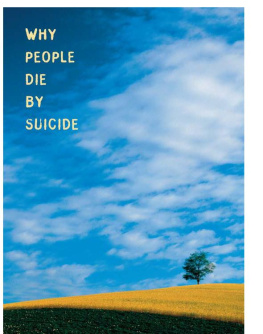
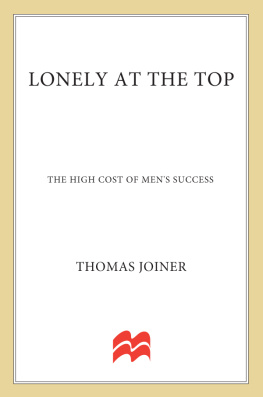
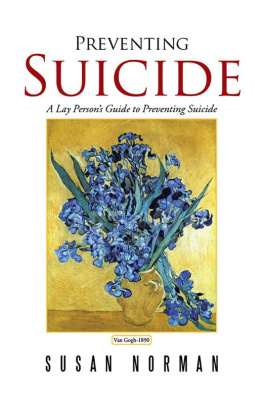
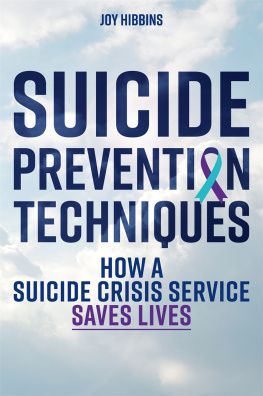
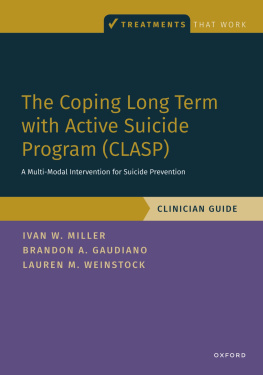
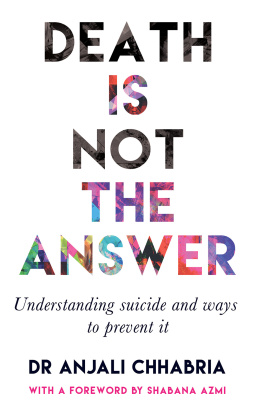
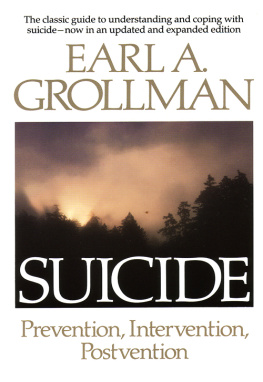

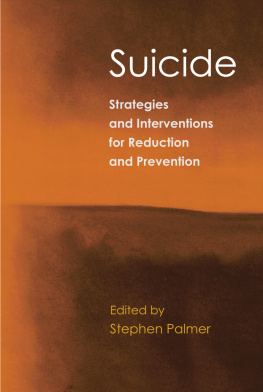

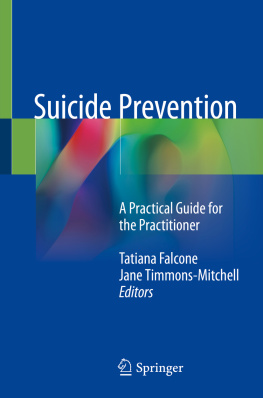

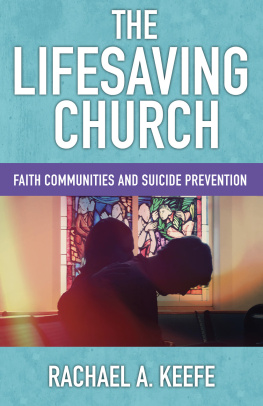
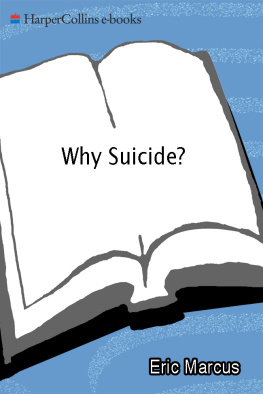
 WHY PEOPLE DIE BY SUICIDE WHY PEOPLE DIE BY SUICIDE Thomas Joiner Harvard University Press Cambridge, Massachusetts, and London, England This book is dedicated to those whohave lost someone to suicide, andespecially to those who have beensupportive of survivors like me,including, for example, my friendsfrom high school, who did all theright things. Copyright 2005 by the President and Fellows of Harvard College All rights reserved Printed in the United States of America First Harvard University Press paperback edition, 2007 Library of Congress Cataloging-in-Publication Data Joiner, Thomas E. Why people die by suicide / Thomas Joiner. p. cm. Includes bibliographical references and index. paper) ISBN-10 0-674-01901-6 (cloth: alk. paper) ISBN-13 978-0-674-02549-3 (pbk.) ISBN-10 0-674-02549-0 (pbk.) 1. Suicide. 2. 2.
WHY PEOPLE DIE BY SUICIDE WHY PEOPLE DIE BY SUICIDE Thomas Joiner Harvard University Press Cambridge, Massachusetts, and London, England This book is dedicated to those whohave lost someone to suicide, andespecially to those who have beensupportive of survivors like me,including, for example, my friendsfrom high school, who did all theright things. Copyright 2005 by the President and Fellows of Harvard College All rights reserved Printed in the United States of America First Harvard University Press paperback edition, 2007 Library of Congress Cataloging-in-Publication Data Joiner, Thomas E. Why people die by suicide / Thomas Joiner. p. cm. Includes bibliographical references and index. paper) ISBN-10 0-674-01901-6 (cloth: alk. paper) ISBN-13 978-0-674-02549-3 (pbk.) ISBN-10 0-674-02549-0 (pbk.) 1. Suicide. 2. 2.